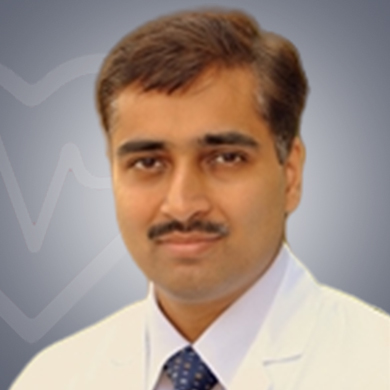
Opthalmologist
Artemis Health Institute , Gurgaon, India21 Years of experience
Speaks: English
One of the eminent ophthalmologists, Dr Sameer Kaushal treats a variety of conditions with high success rates. The conditions treated are as follows::
The treatment for dry eye is decided after an opthalmologist performs tests and evaluates the severity of the disease. The treatment options may include proper dieting, medications, and surgery. The doctor might use certain antibiotics for bacterial conjunctivitis. Antibiotics might lessen the duration of the infection.
Eye conditions can produce different symptoms and these can differ from person to person. Some of the signs and symptoms of different types of eye conditions include:
If you did not have an eye examination for more than one year, you must consult your opthalmologist. You should remain aware of some warning signs of eye problems as this can help you take the required steps for the health of your eyesight. In some cases, detached retina and onset of glaucoma, quick intervention is required to minimize the permanent vision loss.
You can consult Dr Sameer Kaushal from 10 am to 5 pm. The ophthalmologist works an average of 47 hours per week.
Ophthalmologist Sameer Kaushal has performed a wide range of procedures. Some of the popular procedures performed by the doctor include:
LASIK is the most common type of eye surgery that fixes issues with the way the eyes focus. It could be an alternative to glasses and contact lenses. During this surgery, a special kind of cutting laser is utilized to change the shape of the clear tissue in the cornea to improve vision.

Share Your Experience about Dr. Sameer Kaushal

Ophthalmologists are doctors who handle the medical aspects of eye care, such as treatment, surgery, and prescription of glasses and contact lenses as well as medicines for different eye problems. Some ophthalmologists work with other eye care team, coordinate with optometrists as well as other medical professionals to provide care for chronic eye conditions. If you have an eye problem such as cataracts or any other conditions that would require surgical treatment, an ophthalmologist is a suitable doctor to address your problem. Though an ophthalmologist generally treats eye-related problems, they may also offer consultation for conditions that are not linked to the eyes. They also take part in scientific research to find new treatment methods.
An opthalmologist may suggest the below-listed tests for the diagnosis of eye conditions:
An eye exam involves a number of tests to check your vision and eye diseases. The eye doctor will use various instruments and focus bright lights at the eyes and ask you to look through an array of different lenses. Each test in an eye exam will evaluate a different aspect of vision and eye health..
Some of the signs you need to visit an ophthalmologist include:
If you notice the above-listed signs and symptoms, you are suggested to see an opthalmologist for a proper diagnosis of the condition. The opthalmologist will evaluate the test reports and will plan the treatment that is best for you.